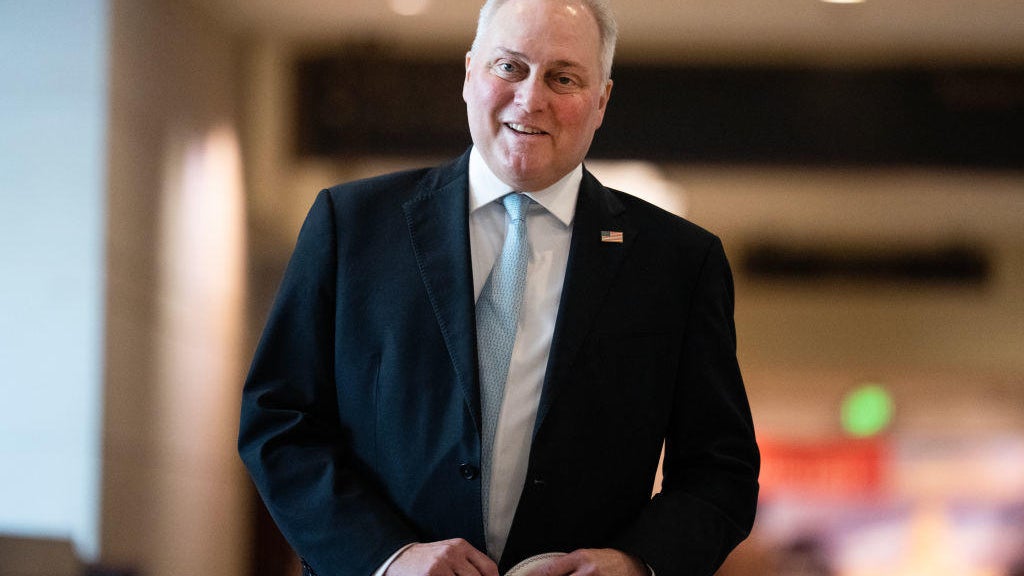House Majority Leader Steve Scalise Selected as GOP Nominee for Speaker
Key Highlights :

Washington — Republican lawmakers on Wednesday selected Majority Leader Steve Scalise as their nominee for speaker of the House, teeing up the election to fill the seat left vacant after the historic ouster of Rep. Kevin McCarthy last week. Scalise defeated Judiciary Committee chair Jim Jordan, a conservative firebrand, in the race for the gavel by a vote of 113 to 99, members said. House Republicans met behind closed doors to choose their nominee.
Scalise will still need to secure 217 votes from the full House in order to take the helm of the lower chamber, and Republicans who voted for Jordan to become the nominee are under no obligation to vote for Scalise. Some GOP members said there could be a vote on the House floor as soon as Wednesday, though others objected to rushing to a vote so soon after the internal meeting. The House reconvened at 3 p.m. and immediately went into recess.
McCarthy was removed in an historic vote last week, setting up the head-to-head battle between Scalise and Jordan for the gavel. The House has been at a standstill since the unprecedented vote that left the speaker post vacant, though the attacks in Israel have lent urgency to filling the role. "We have a lot of work to do, not just in the House for the people of this country, but we see how dangerous of a world it is and how things can change so quickly," Scalise told reporters after the closed-door election. He indicated that the House should move swiftly in formally electing a speaker given the war in Israel, adding, "We need to make sure we're sending a message to people all throughout the world that the House is open and doing the people's business."
Scalise said that if he takes the helm as speaker, the House will first take up a resolution declaring U.S. support for Israel. But the next speaker will also be confronted with a fast-approaching deadline to fund the government after Congress late last month passed legislation to keep agencies operating through Nov. 17.
Republicans did not cast public votes for McCarthy's successor, and instead selected Scalise to be their nominee by secret ballot. The Louisiana Republican's nomination caps his rise throughout the ranks of GOP leadership, which included stints as majority and minority whip and majority leader, a position to which he was elected after Republicans took control of the House in November 2022.
Lawmakers who emerged from a morning meeting of the Republican conference earlier Wednesday said they tabled an amendment to conference rules that would have raised the threshold required to nominate a speaker. The amendment, proposed by Reps. Chip Roy and Brian Fitzpatrick, would have required any candidate to win 217 votes — the current majority since there are two vacancies — before the full House takes a floor vote. Instead, Scalise only needed half of the conference's support. The rule change sought to avoid the spectacle of the multiple rounds of voting that McCarthy endured in his bid for speaker in January, which ended after four days and 15 ballots.
Scalise's relatively narrow victory for his party's nomination sets up what could be another lengthy floor battle. Given Republicans' slim majority, it will be difficult for Scalise to unite the GOP conference and win the gavel, given Democrats' expected unanimous opposition. Scalise met with Jordan after the nomination vote on Wednesday, and Jordan told Scalise he wouldn't encourage his supporters to vote for him. A source told CBS News that Jordan will vote for Scalise. But a number of Jordan's supporters indicated on X, formerly Twitter, that they would still be voting for him, including Roy and Reps. Marjorie Taylor Greene and Michael Cloud.
Speaker pro tempore Patrick McHenry, who has been the interim speaker since McCarthy's ouster, indicated he would give Scalise time to build support before calling a formal vote. "The speaker designee has the right to put his votes together for the floor and make sure the timing is right, so we're going to let that happen," McHenry said. "We're in an unprecedented moment. This is the fastest speaker's election in modern history."
Moderate GOP Rep. Ken Buck of Colorado said on MSNBC that it was his understanding that Scalise had seven hard no votes against him, with seven undecided Republican votes. Buck said he voted "present" on the nomination and is still undecided, although he did say he believed Republicans would eventually "come together behind Steve Scalise." Buck said he is undecided in part because Scalise couldn't "unequivocally and publicly state that the election, the 2020 presidential election was not stolen" when Buck asked him during a meeting on Tuesday.
The need to elect a new House speaker arose after Rep. Matt Gaetz, a Florida Republican, forced a vote to remove McCarthy last week after he reached an 11th-hour deal to avert a government shutdown with the help of House Democrats. Eight Republicans ultimately joined with all Democrats to vote to oust McCarthy. Scalise and Jordan quickly emerged as the two contenders vying for the gavel. Though Gaetz declined to announce who he would vote for in the run-up to the closed-door vote, he told reporters after he "can't wait" to vote for Scalise on the House floor. Gaetz declined to support McCarthy during the floor vote in January. "Long live Speaker Scalise," he said.
The House Republican conference met privately Tuesday night for a long candidate forum and took questions from rank-and-file members. Rep. Mike Garcia, of California, estimated that between 30 and 40 Republicans asked questions of the two. Speaking on Fox News on Wednesday morning, Scalise said lawmakers "have to get the House back to work," adding there are "real things that need to be done."
